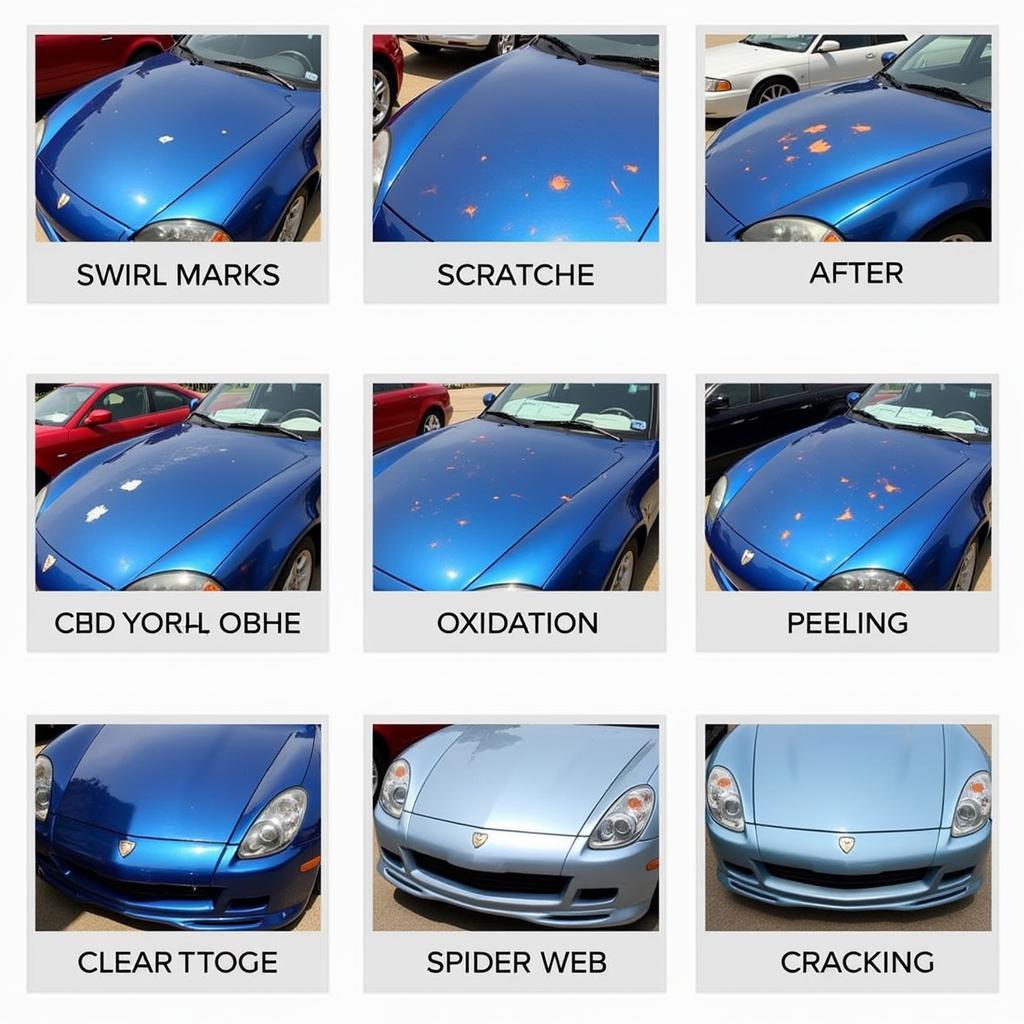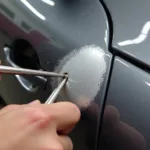Maintaining your car’s pristine appearance isn’t just about aesthetics; it’s about protecting your investment. A vital part of this is the clear coat, a protective layer that shields your car’s paint from the elements. When this layer is damaged, it can lead to unsightly blemishes and even compromise the underlying paint. This guide will delve into the nuances of car paint clear coat repair, equipping you with the knowledge to address these issues effectively.
Whether it’s minor scratches, swirl marks, or more severe damage, understanding the repair process can save you time and money. We’ll cover everything from DIY fixes for superficial damage to professional solutions for more extensive repairs. By the end of this guide, you’ll be well-versed in car paint clear coat repair and ready to restore your car’s finish to its former glory.
We’ll be exploring various methods, from simple touch-ups to more advanced techniques, helping you choose the right approach based on the severity of the damage. This includes assessing the damage, selecting the right materials, and mastering the application techniques for a seamless finish. Let’s dive in and uncover the secrets to a flawless car paint clear coat repair.
Identifying Clear Coat Damage
Recognizing the signs of clear coat damage is the first step towards effective repair. These signs can range from minor imperfections to more noticeable blemishes. Look for these common indicators:
- Swirl Marks: These are fine, circular scratches often caused by improper washing techniques.
- Scratches: Deeper scratches that penetrate the clear coat can appear white or lighter than the surrounding paint.
- Oxidation: This appears as a hazy or cloudy film on the paint, making it look dull and faded.
- Peeling or Flaking: In severe cases, the clear coat can start to peel or flake away, exposing the underlying paint to the elements.
- Spider Web Cracking (Crazing): Fine cracks resembling a spider web indicate significant clear coat damage.
Having a firm grasp on the different types of damage will help you determine the best course of action for your car paint clear coat repair.
DIY Car Paint Clear Coat Repair for Minor Scratches
For minor scratches and swirl marks, you can often perform a DIY car paint clear coat repair using readily available products. This approach can be cost-effective and yield impressive results. Here’s a step-by-step guide:
- Wash and Dry the Affected Area: Thoroughly clean the area with car wash soap and water, then dry completely.
- Assess the Damage: Determine the depth of the scratches. If they are only superficial, a rubbing compound or polishing compound should suffice.
- Apply Rubbing Compound (If Necessary): If the scratches are slightly deeper, start with a rubbing compound. Apply a small amount to a clean microfiber cloth and rub gently in circular motions.
- Apply Polishing Compound: Follow up with a polishing compound to remove any remaining swirl marks and restore shine.
- Apply a sealant or wax: This will protect the newly repaired area and enhance the shine.
- Inspect the Results: Check your work in direct sunlight to ensure all imperfections are gone.
Remember, if you’re unsure about tackling the car paint clear coat repair yourself, consulting a professional is always the best option. For more targeted advice on specific issues like oxidized paint, see our guide on how to repair oxidized car paint spots.
Professional Car Paint Clear Coat Repair
For more extensive damage, such as deep scratches, peeling, or cracking, professional car paint clear coat repair is recommended. Experts have the tools and expertise to restore your car’s finish to its original condition. They can:
- Assess the Damage: Professionals can accurately diagnose the extent of the damage and recommend the most appropriate repair method.
- Color Matching: They can precisely match the existing paint color for a seamless repair.
- Sanding and Preparation: Professionals will properly prepare the surface for repainting, ensuring a smooth and even finish.
- Clear Coat Application: They apply multiple layers of clear coat, ensuring proper coverage and protection.
- Buffing and Polishing: The final step involves buffing and polishing to achieve a flawless, high-gloss finish.
Professional repair ensures a high-quality, long-lasting finish. While DIY solutions might be suitable for minor imperfections, professional expertise is essential for more significant damage. For localized repairs, consider exploring our guide on car spot paint repair. If you’re dealing with dark spots, check out dark spot paint repair car. For rust related damage, check out our guide on repair rust spots car paint.
Conclusion
Car paint clear coat repair is crucial for maintaining your vehicle’s appearance and protecting its value. From minor scratches to significant damage, understanding the repair process is essential. Whether you choose a DIY approach or seek professional help, addressing clear coat damage promptly will keep your car looking its best. Remember that choosing the right approach for car paint clear coat repair depends on the severity of the damage. For spot repairs, our guide on car paint spot repair offers helpful insights.
FAQ
- How long does clear coat repair last?
A properly applied clear coat repair can last for several years. - Can I wax my car after clear coat repair?
Yes, waxing after the repair is recommended to enhance shine and protection. - How can I prevent clear coat damage?
Regular washing, waxing, and avoiding harsh chemicals can help prevent damage. - What is the cost of professional clear coat repair?
The cost varies depending on the extent of the damage and the vehicle. - Is it possible to repair clear coat without repainting?
Yes, minor scratches and swirl marks can often be repaired without repainting. - What is the difference between rubbing compound and polishing compound?
Rubbing compound is more abrasive and used for deeper scratches, while polishing compound is finer and used for restoring shine. - Can I repair clear coat damage in direct sunlight?
No, it’s best to avoid working in direct sunlight as it can cause the products to dry too quickly.
Need further Assistance?
Contact us via WhatsApp: +1(641)206-8880, Email: [email protected]. Our team is available 24/7 to assist you.


